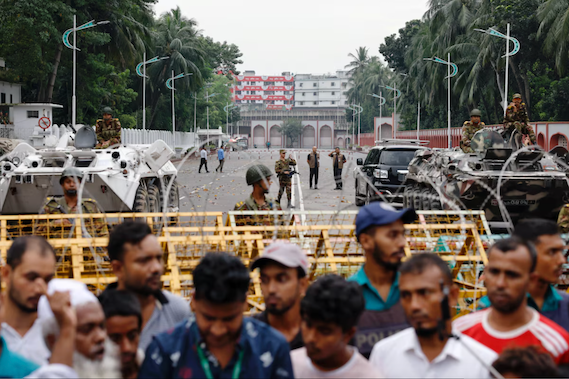DHAKA: Bangladesh’s interim government has banned the student wing of the Awami League party of ousted prime minister Sheikh Hasina’s, citing the group’s role in the deadly violence during the recent popular uprising.
A gazette notification issued by the Ministry of Home Affairs on Wednesday night said the Bangladesh Chhatra League was banned under the Anti-Terrorism Act with immediate effect.
The ministry accused the BCL of misconduct over the past 15 years, including violence, harassment and exploitation of public resources.
The notification said there was evidence of the group’s “conspiratory, destructive and provocative acts against the nation along with various terror activities” during the nationwide protest that forced Hasina to flee to India.
Initially peaceful student-led demonstrations started in Bangladesh in early July against public-sector job quotas. Two weeks later, they were met with a violent crackdown by security forces aided by BCL activists, which according to UN estimates left more than 600 people dead.
The violence led to a nationwide uprising, which on Aug. 5 forced Hasina to leave for neighboring India and an interim cabinet led by Nobel Peace laureate Muhammad Yunus took charge.
There was no comment from the Awami League as many of its leaders have been arrested over accusations of their role in the unrest, the Bangladesh Nationalist Party — the main opposition party, whose members were persecuted during Hasina’s 15-year rule — was not enthusiastic about the ban.
“What we believe in is the rule of law. Whenever any such decision is taken, it ought to be made through a process of law. Anything that is extraordinary and beyond due process will always have some pitfalls. I believe, if a public hearing or some more clear legal process was adhered to prior to invoking such a decision, it would be more acceptable,” Nawshad Jamir, BNP’s international affairs secretary, told Arab News.
“BCL has done some most heinous crimes in the past however, even then, they are also entitled to a fair justice system.”
The banning of BCL and crackdown on Awami League comes in response to escalating demands from the student movement that organized the July protest. The movement’s members have been also calling for the removal of President Mohammed Shahabuddin — an Awami League member, who in accordance with Bangladesh’s constitution remained in office after Hasina’s resignation.
Prof. Touhidul Islam, who teaches conflict resolution at Dhaka University, warned against growing social polarization if the interim government was going to achieve national reconciliation, which was one of the first promises made by Yunus as he took office.
“This ban will have a significant influence in the broader political scenario of the country,” he said.
“When there is polarization in society, it always keeps away the concept of reconciliation. The focus should be on minimizing the differences. We are cautiously watching the political developments at the moment.”
The banning of political entities did not contribute to “healthy politics and a democratic system,” Prof. Zarina Rahman, former public administration lecturer at Dhaka University, told Arab News.
“If someone, or an organization, is found to be a terrorist or anti-social element, they should be tried. Someone should be charged with specific accusations,” she said.
“We have a common tendency to remove the head in case of a headache ... If someone violates the rules, we should hold him or her responsible for the particular misdeeds. The authorities should try this method first.”
























